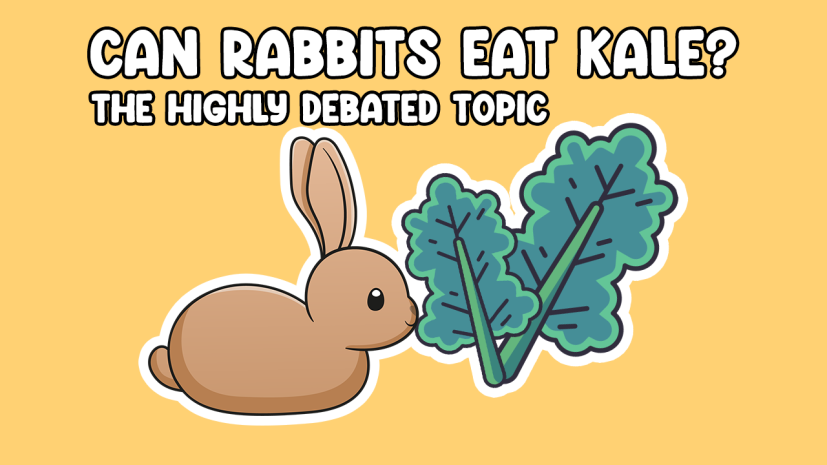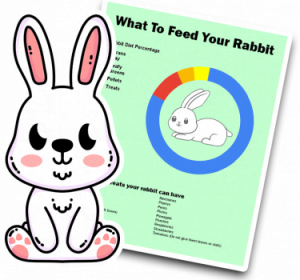
Introducing a variety of fresh vegetables into a rabbit’s diet is crucial for their overall health and well-being. While rabbits primarily thrive on hay and pellets, incorporating leafy greens can give them additional nutrients and hydration.
However, not all greens are suitable for rabbits, and it’s critical that you understand if kale is a safe choice for our floppy-eared friends.
The simple answer is yes. But it depends on your rabbit’s gut sensitivity and how much you feed them. Regarding leafy greens, Kale is famous among Rabbit Groups on Facebook for its highly debated “Can it be eaten” topic, etc.
There’s a common quote that goes around which states the following:
Never give your rabbit kale or spinach. Kale and spinach can cause health problems over time, due to the high amount of oxalates and goitrogens.
– home.adelphi.edu
However, this is too vague and errs on the side of caution too much. In this post, we will finally debunk the worries and explain why eating Kale is generally okay for your rabbit.
Kale is known for its rich nutritional profile. It is packed with vitamins A, C, and K, along with minerals like calcium, potassium, and iron.
These nutrients are essential for maintaining a rabbit’s health and supporting its immune system. However, it’s important to note that kale is high in calcium, which can concern rabbits when fed excessively.
| Nutrient | Amount per 100g |
|---|---|
| Calories | 43 |
| Carbohydrates | 4.42 |
| Protein | 2.92g |
| Fat | 0.9g |
| Fiber | 4.1g |
| Vitamin A | 9990 IU |
| Vitamin C | 120mg |
| Vitamin K | 817mcg |
| Calcium | 150mg |
| Iron | 1.5mg |
| Potassium | 491mg |

Feeding kale to rabbits in moderation can offer several benefits. The high fiber content in kale aids in maintaining a healthy digestive system for rabbits. Additionally, the presence of vitamins and minerals supports their overall well-being. Kale can also provide a refreshing change in taste and texture for rabbits, making their meals more interesting.
While kale can be a nutritious addition to a rabbit’s diet, it does have potential risks. As mentioned earlier, kale contains a high amount of calcium. Excessive calcium intake can lead to health issues like bladder stones in rabbits. Therefore, feeding kale in moderation and alongside a balanced diet is crucial to avoid an imbalance in calcium levels.
While oxalates can be a concern for some animals, such as reptiles, rabbits have a relatively low risk of developing health issues related to oxalate consumption. This is because rabbits have a unique digestive system adapted to handle a specific level of oxalates.
Rabbits have a specialized mechanism for processing calcium. They efficiently absorb calcium in their intestines and excrete excess calcium through their urine. This process helps minimize the risk of calcium-related issues in rabbits, such as bladder stones or kidney problems.
Typically, feeding rabbits kale in moderation should not pose significant risks related to oxalates. It’s a great dark green as part of a varied and balanced diet. This helps ensure a diverse nutrient intake and minimizes the potential impact of any individual compound, including oxalates.

Not every rabbit can digest Kale easily, which may give them gas. However, several other greens are safe and healthy for rabbits and are not part of the Brassica family. These include:
If your rabbit is sensitive to Brassica Greens (Like Kale), you should also avoid Broccoli, Cabbage, Brussels Sprouts, and Cauliflower as they have potential gas-inducing properties.
These greens offer a variety of flavors and nutrients, ensuring a well-rounded diet for your rabbit.
While kale can be a nutritious addition to a rabbit’s diet, overfeeding can lead to health issues. Watch out for signs of digestive problems such as diarrhea or bloating.
Excessive calcium intake can manifest as urinary issues or the formation of bladder stones. If you notice any concerning symptoms, consult a rabbit-savvy veterinarian for proper guidance and treatment.
While kale can be a part of a rabbit’s diet, it is not recommended to feed it every day. Moderation is key to avoiding an excessive intake of calcium.
Yes, rabbits can eat kale stems. However, ensure that the stems are fresh, clean, and free from any pesticides or contaminants.
Overfeeding kale or other greens can cause digestive issues in rabbits, including diarrhea. You should always introduce new foods gradually and monitor their response.
It is best to offer fresh and crisp kale leaves to rabbits. Wilted leaves may not be as appealing to them and could indicate a loss of nutritional value.
Whilst there are no official studies, Kale flowers are safe for rabbits. However, rabbits generally prefer the leaves and stems of kale over the flowers.

By entering your email address you agree to receive emails from Cottontailclub. We'll respect your privacy and you can unsubscribe at any time.